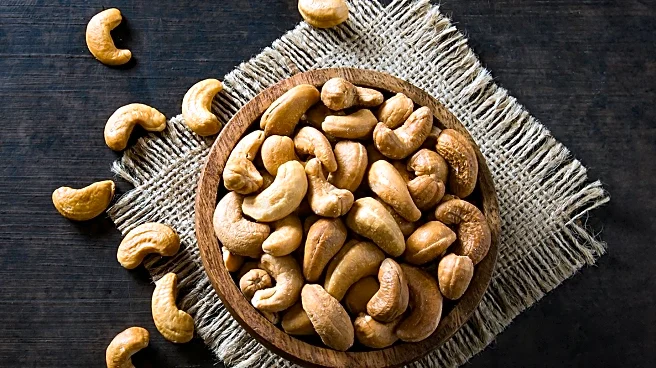What's Happening?
Recent studies have highlighted the potential heart health benefits of consuming cashews regularly. Cashews, known for their creamy texture and nutrient-rich profile, contain heart-healthy fats, essential
minerals like magnesium and potassium, and powerful antioxidants. These components are believed to support cardiovascular function by lowering blood pressure, improving cholesterol balance, and reducing triglyceride levels. The nuts are rich in monounsaturated and polyunsaturated fats, which help lower harmful LDL cholesterol while maintaining healthy HDL cholesterol levels. This balance is crucial for reducing plaque buildup in arteries and improving blood circulation, thereby lowering the risk of coronary artery disease. Additionally, cashews contain antioxidants such as polyphenols and tocopherols, which protect heart tissue and reduce inflammation.
Why It's Important?
Heart disease remains a significant global health issue, and dietary changes can play a crucial role in prevention. The inclusion of cashews in a balanced diet may offer a simple yet effective way to enhance cardiovascular health. By improving lipid profiles and supporting blood pressure regulation, cashews can contribute to a healthier heart. The presence of magnesium and potassium in cashews aids in blood vessel relaxation and sodium balance, further preventing hypertension. Regular consumption of cashews, even in small amounts, can support healthier cholesterol and triglyceride levels, especially when combined with a diet low in processed foods and rich in fresh produce and whole grains. This dietary approach may help manage blood pressure naturally and reduce the risk of heart disease.
What's Next?
As awareness of the health benefits of cashews grows, individuals may increasingly incorporate them into their diets as part of a heart-healthy lifestyle. Healthcare professionals might recommend cashews as a dietary supplement for patients seeking to improve cardiovascular health. Further research could explore the long-term effects of cashew consumption on heart disease prevention and management. Additionally, food industry stakeholders may develop new products featuring cashews to cater to health-conscious consumers. Public health campaigns could emphasize the importance of nuts in a balanced diet, potentially influencing dietary guidelines and recommendations.
Beyond the Headlines
The broader implications of cashew consumption extend beyond heart health. Cashews are calorie-dense yet rich in protein, fiber, and healthy fats, which can aid in weight management by increasing satiety and preventing overeating. This aspect is particularly relevant given the rising concerns about obesity and its associated health risks. Moreover, the antioxidants in cashews may offer protective benefits against oxidative stress and inflammation, contributing to overall health and longevity. As dietary habits evolve, cashews could play a role in promoting sustainable and health-focused food choices.










